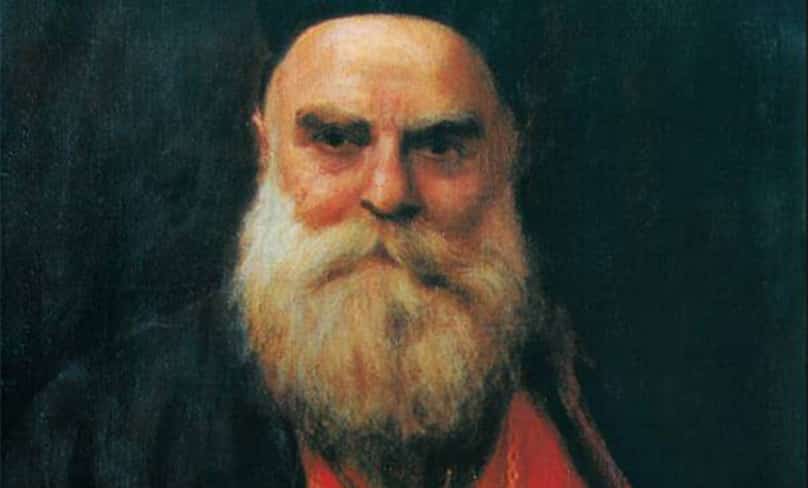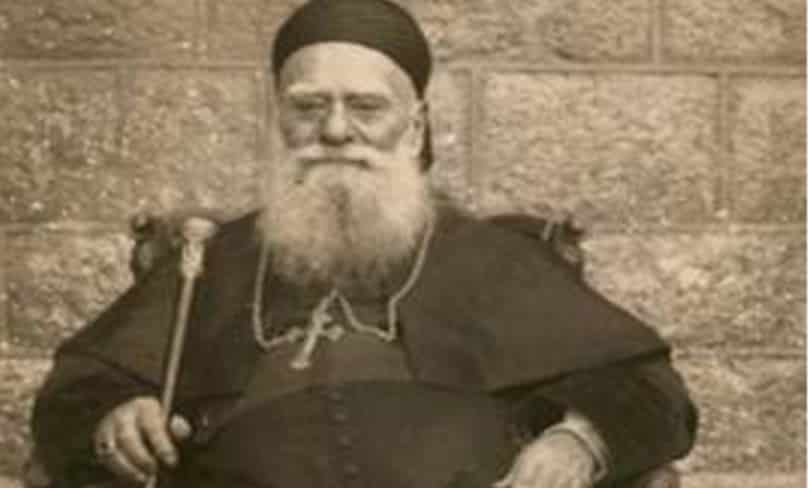
By Dr Margaret Ghosn mshf
Elias Boutros Howayek, born 4 December 1843 in Helta, North Lebanon, went on to become a priest (1870-1899), bishop (1889-1899) and Maronite Patriarch of Antioch (1899-1931).
Elias is considered one of the four founders of modern Lebanon alongside Fakhr el Din II, Bashir II and Youssef Beik Karam.
Elias Boutros Howayek’s Ordination to the Priesthood occurred on 5 June 1870 in Rome. He was of the view that:
- minimal education impoverished chances of advancement
- the neglected lacked dignity
- an occupied country experienced poverty of freedom
- distance from God was poverty of the human
As such, Elias committed his life to removing the causes of poverty and hardship from society.
“He became the 72nd Maronite Patriarch on 6th December 1899 until his death on Christmas Eve 1931 … As Patriarch he focused on justice, truth, freedom and humanitarian deeds.”
On 14 December 1889, Elias was consecrated Bishop of Arqa and appointed Patriarchal Vicar of the Eparchy. In this role he opposed all forms of oppression, and focused his efforts on returning the migrated Lebanese back to their homeland. He assisted those convicted with lengthy jail sentences and with persistent determination ensured justice was served.
He displayed constant concern for all and insisted families and communities be governed through humanitarian and Gospel values.
This deep concern for humanity saw him found the Congregation of the Maronite Sisters of the Holy Family.
In the consistory of 19 June 1899, Elias Howayek was ratified as the choice of Maronite bishops by Pope Leo XIII. He became the 72nd Maronite Patriarch on 6th December 1899 until his death on Christmas Eve 1931. So commenced a new era for Lebanon and the Maronite Church. As Patriarch he focused on justice, truth, freedom and humanitarian deeds. In his private life, he practiced ascetical and contemplative aspects and spent hours in daily prayer and fasting.

Lifetime Achievements
- Patriarch Elias Howayek was active in the social, political and religious spheres, exerting his influence during a decisive era. His many achievements include:
- Founded a Maronite Church in Paris with financial sponsorship from the French Government and re-opened the Maronite College in Rome
- Founded a Maronite Eparchy in Egypt
- Pastoral concern for Lebanese migrants, sending them assistance through delegates
- Annual pastoral visits to the parishes, in particular the secluded villages
- Worked towards achieving irrigation for fields and encouraged the planting of olive and blueberry trees in Patriarchal estates
- Founded the Congregation of the Maronite Sisters of the Holy Family in 1895
- Raised the Statue of Our Lady of Lebanon at the peak of Harissa on 3rd May 1908
- Opened the doors of the Patriarchal treasury in Bkerke to the poor, along with opening of the monasteries in response to the hunger of the 1916 war
- When Lebanon was in danger of being absorbed by King Faisal and the United Arab Kingdom, Elias obtained unanimity among Maronites and other Lebanese communities
- Persuaded France and other nations at the Peace Congress of Versailles to favour the Lebanese cause, while Lebanon was facing oppression by the Turks
- A major player in the formation and declaration of the Independence of Greater Lebanon in September 1920 declared by General Gouraud
“. . . you see God’s greatness in the mountains, in the thunder and storm God’s wrath, in the water is God’s goodness and God’s kindness is in the breeze, and God’s beauty in the flowers, and in the ocean and sky God’s vastness, and in the natural order God’s wisdom, and in the stars and planets God’s brilliance.
Below are a few quotes of the Patriarch that show a passion for life:
“A good citizen is attentive to what they eat, drink, wear, their furnishings and luxuries, in order to support local interest. If we are sincere about our homeland, we must learn to be moderate in all things, leaving extravagance aside, using the produce of the country first and only when necessary, purchasing exports. (Love of the Nation, 1930)
“But we are all one people without distinction between faiths and sects. (Evidence of eternal care)
So do all things for Jesus, with him and near him, as was the way in Nazareth . . . (Letter to the Sisters, written 22 July 1921)
“. . . you see God’s greatness in the mountains, in the thunder and storm God’s wrath, in the water is God’s goodness and God’s kindness is in the breeze, and God’s beauty in the flowers, and in the ocean and sky God’s vastness, and in the natural order God’s wisdom, and in the stars and planets God’s brilliance. (Letter to the Sisters, 26 July 1930)
“The cross is here, perfect joy is there on high, while love is here and there. (Letter to the Sisters, 25 July 1931)
“All this I accept from the hand of God! On Him I rely! He is everything and enough for me, He takes care of my affairs in my joys and in my sorrows! My only concern is to work for His pleasure, and that I be united to Him in all circumstances, through thick and thin, in distress and in relief, so that nothing separates me from His love. (Letter to the Sisters, 25 July 1931)
Pope Francis authorised the promulgation of decrees on the heroic virtues of Patriarch Elias Howayek, declaring him Venerable on 5 July 2019.
Margaret Ghosn mshf is a Maronite Sister of the Holy Family and is currently Principal at Maronite College of the Holy Family in Harris Park, Sydney.
